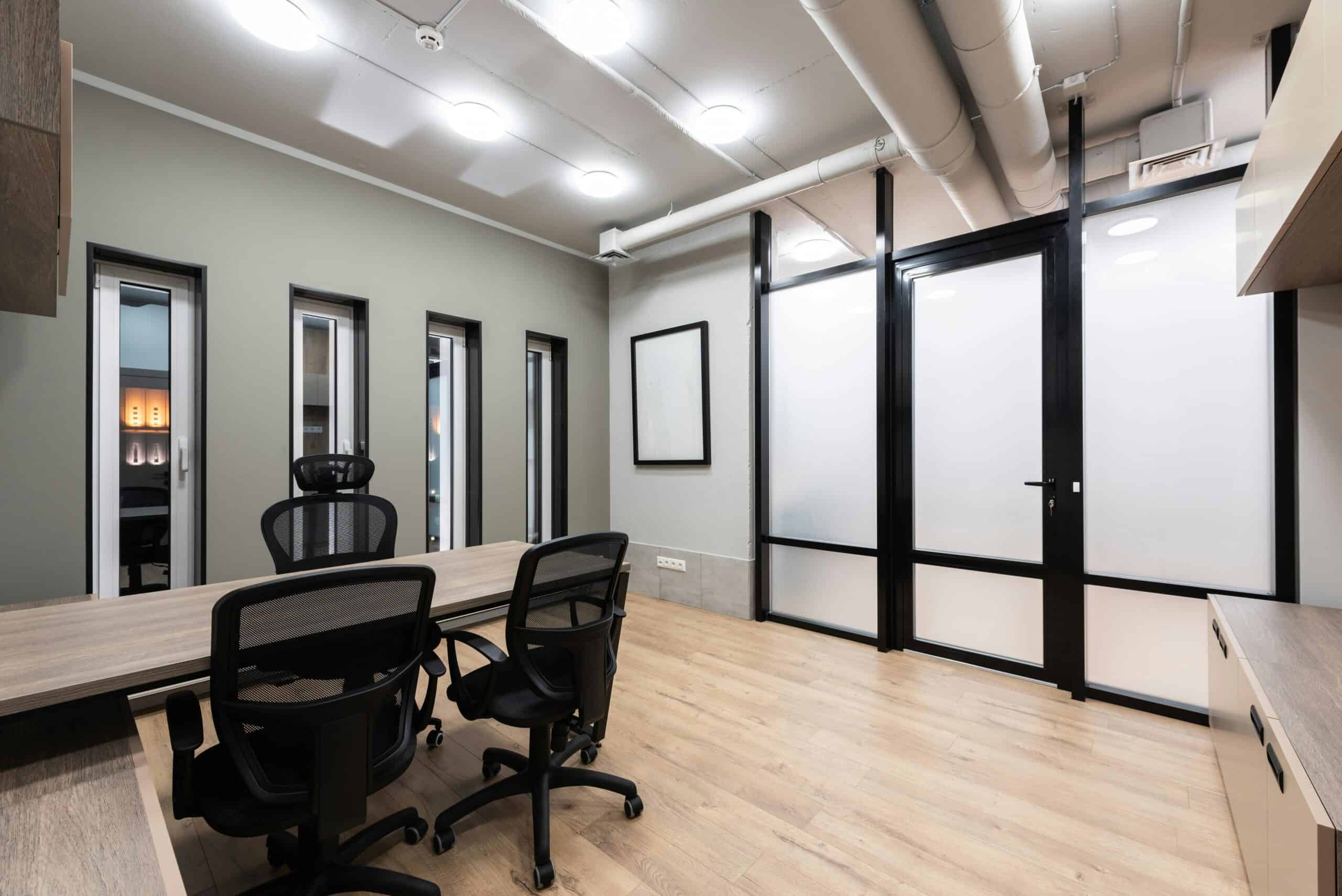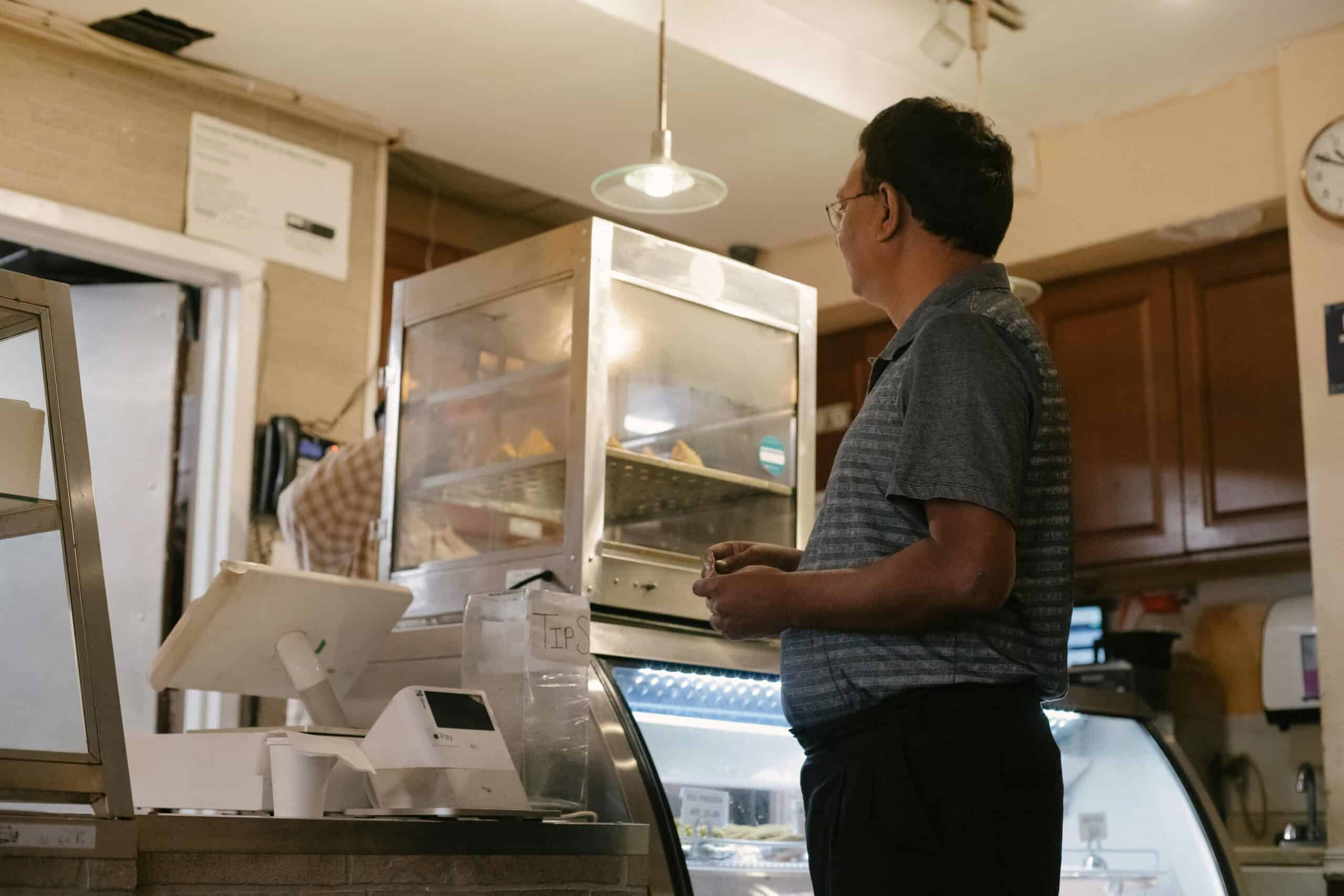When designing your kitchen, you need to decide on the countertop options. And the main questions will be, what material do you prefer? Do you want a stain-resistant surface that's easy to maintain? What types of designs do you like? And other numerous considerations. But first, let's discuss the best type of kitchen countertop options.
Best Type of Kitchen Countertop
1. Granite Countertops
Granite material is among popular kitchen countertops for its incredible durability. In addition, it is a natural stone preferred for high-end kitchens because of its unique color, hues, and veins. Also, its natural beauty makes it an excellent complement to any kitchen.
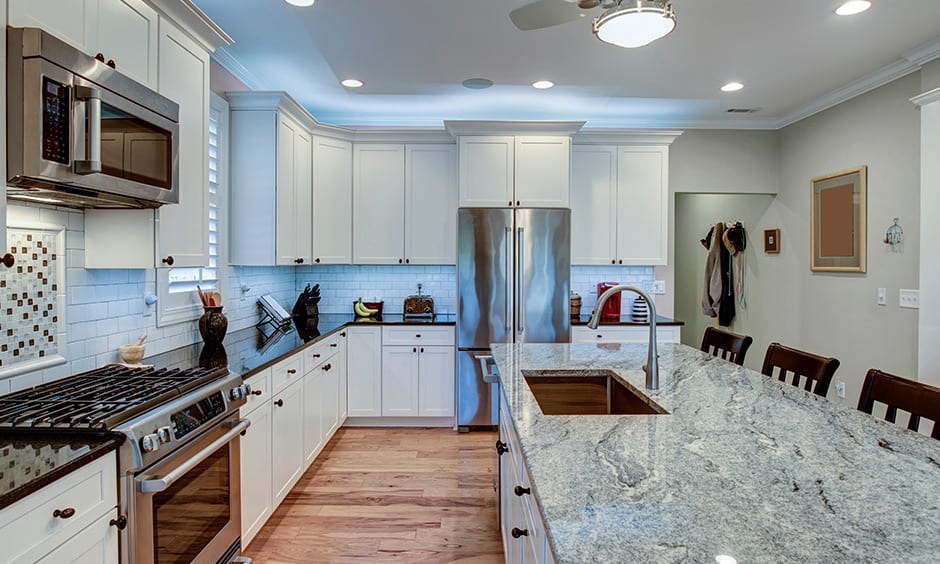
Image Source: designcafe.com
You can often cook on a granite kitchen countertop without worrying about wear and tear. On the other hand, though most granite stones are in the tan color family, there are lighter and darker variants.
The classification of granite countertop materials is based on price: entry-level, mid-grade, and high-grade. Higher grades are distinguished by more thickness and unique patterns. However, the costs may be more affordable due to the increased supply of natural stones and technological advances in production.
Pros:
Cons:
2. Laminate Countertops
Laminate is a cheap man-made material over which a plastic layer has been placed and it has a polished non-porous smooth faced surface that can be easily cleaned. Laminate sheets are mounted on a particle board, known as medium-density fibreboard or MDF to deliver the countertops. Furthermore, you can purchase a laminate countertop in pre-formed portions known as the post-form countertops or fabricated on-site.

Image Source: goodvaluecenter.com
One of the reasons why homeowners prefer laminate countertop is because of the low cost. Other reasons include easy maintenance, various styling options, and resistance to bacteria. In addition, the kitchen countertop material comes in different colors, designs, and styles.
Though the laminate countertop doesn't stain from oil or wine spills, it can chip or burn. Also, we don't recommend it in a high-end kitchen. But, conversely, it's an excellent option for budget-conscious buyers, house flips, or second kitchens.
Pros:
Cons:
3. Marble Countertop
Marble is a beautiful natural stone that has fine grain and intricate carving and it has soft color that matches every taste. Marble countertops are available in polished and honed surfaces, and are especially popular with homeowners who desire the classy look.
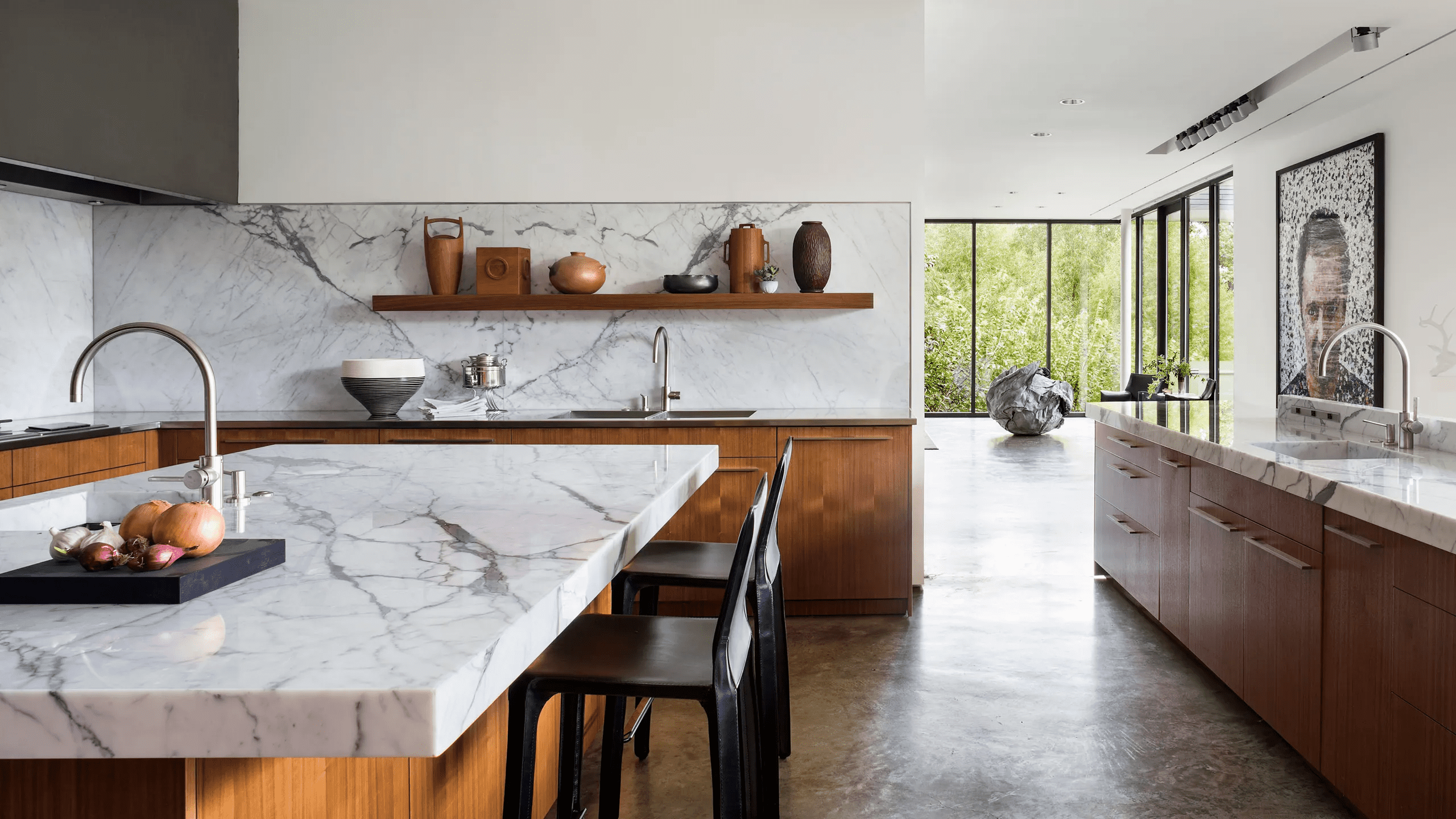
Image Source: architecturaldigest.com
You can expect a unique kitchen countertop since no two sheets of marble are the same. However, marble material is not common across the whole length of counters in most kitchens due to its cost.
Though this kitchen countertop material is expensive, it's not worth the money since it's susceptible to scratches and stains. Also, although newer sealers can reduce the maintenance on marble, it's a far more temperamental natural stone than granite.
Pros:
Cons:
4. Quartz Countertop
Quartz is an engineered stone product shaped into slabs and bonded with resins. It contains up to 93% Quartz particles and other minerals. Besides, Quartz was developed as a more versatile and high-performing substitute for granite and marble. It comes in more colors than granite and features a non-porous surface that's discoloration and stain-resistant.
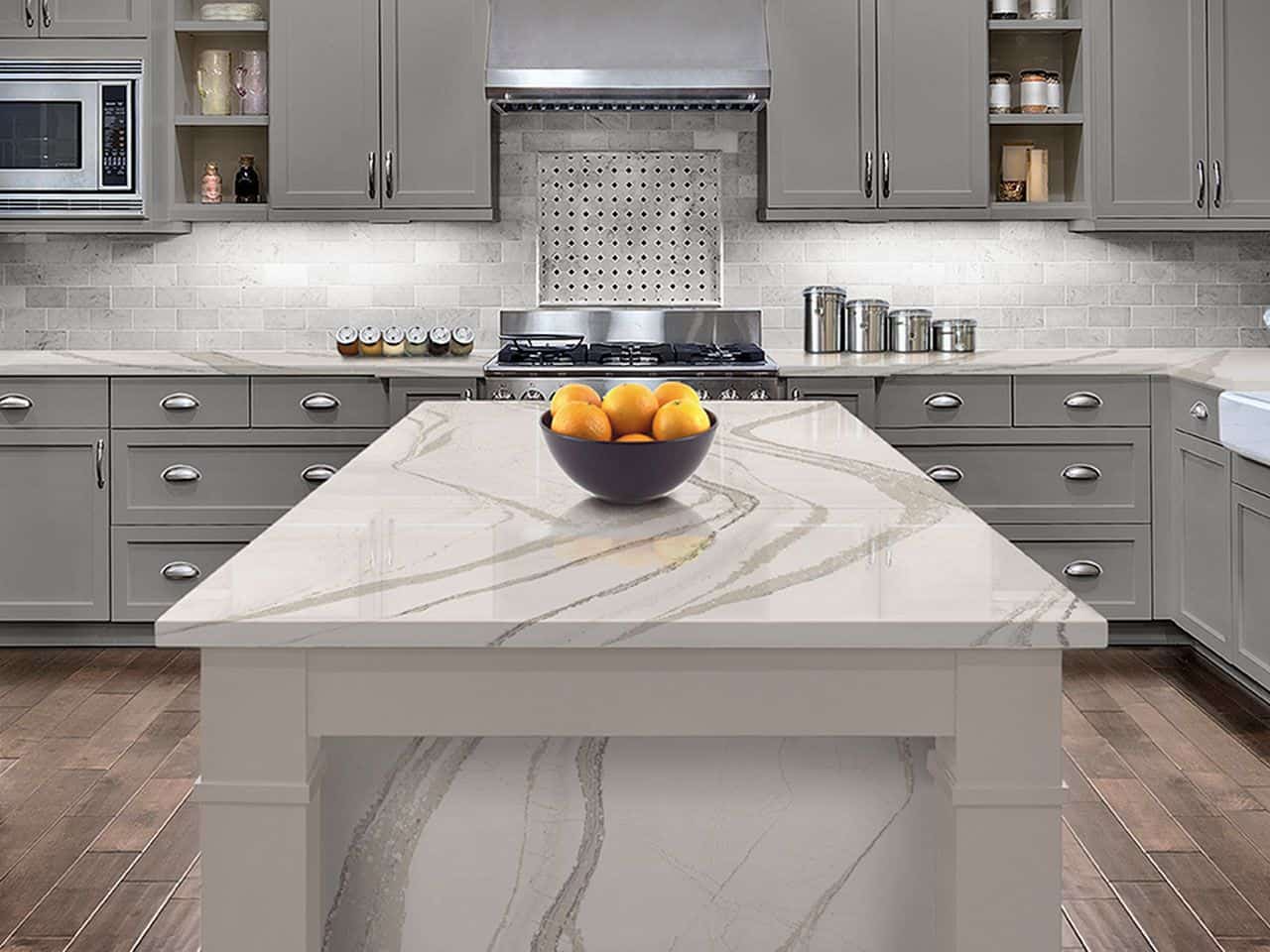
Image Source: homedit.com
Some engineered Quartz materials are replicas of natural marble with the same veining. And unlike natural stone, Quartz does not require annual sealing. Conversely, the Quartz material is extremely diverse. The wide range of colors will help you create an upscale style by choosing the ideal shade for your kitchen countertop. The quartz countertops make the kitchen space unique and aesthetically pleasing.
Pros:
Cons:
5. Soapstone Countertop
Soapstone has a smooth texture similar to silk and is available only in black or dark grey. Most homeowners use soapstone as a granite substitute. In addition, soapstone was found in antique houses; nevertheless, it is also used in houses as a countertop and sink. Also, this is one of the natural stones that closely resembles marble but is way more enduring.
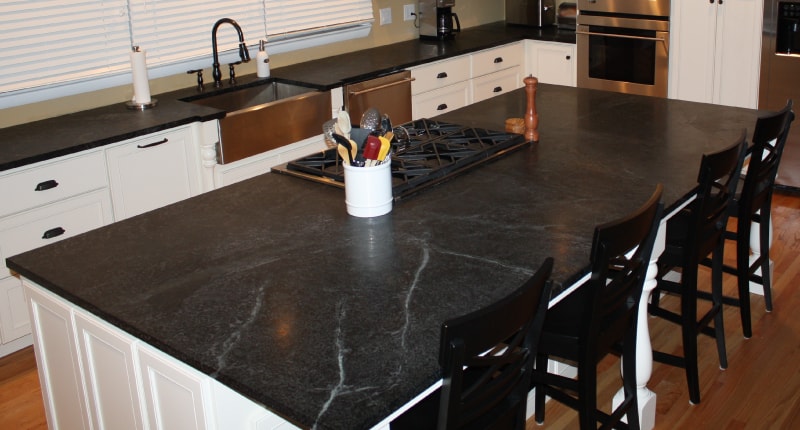
Image Source: haristoneslimited.com
The architectural soapstone material used for kitchen countertops is stain-resistant. It will, however, scratch with time, so it requires regular sealing. It's also heat resistant; therefore, you can place a hot skillet on top without worrying if it will burn.
Pros:
Cons:
6. Solid Surface Countertop
Solid-surface is a manufactured material made of acrylic particles and resins pressed into sheets and various shapes. If you want to balance affordability and style, count on Solid surface countertops. Besides, the solid surface materials can be customized to the kitchen's layout, so there are no unsightly seams.
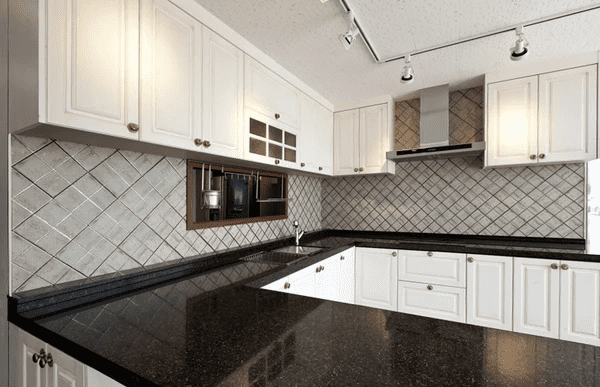
Image Source: hyundailncusa.com
You can use solid surface countertop materials in a high-end kitchen with a large countertop space that would be too expensive to cover with Quartz or granite. Conversely, the material is stain and bacterial-resistant. However, you'll need to be careful with hot pans since it's not heat resistant.
Pros:
Cons:
7. Butcher Block Countertop
Butcher block countertops come in a range of woods and finishes offering natural warmth to kitchen design. Besides, these kitchen countertop materials are quite handy; if they are not sealed and oiled, they function as built-in cutting boards.
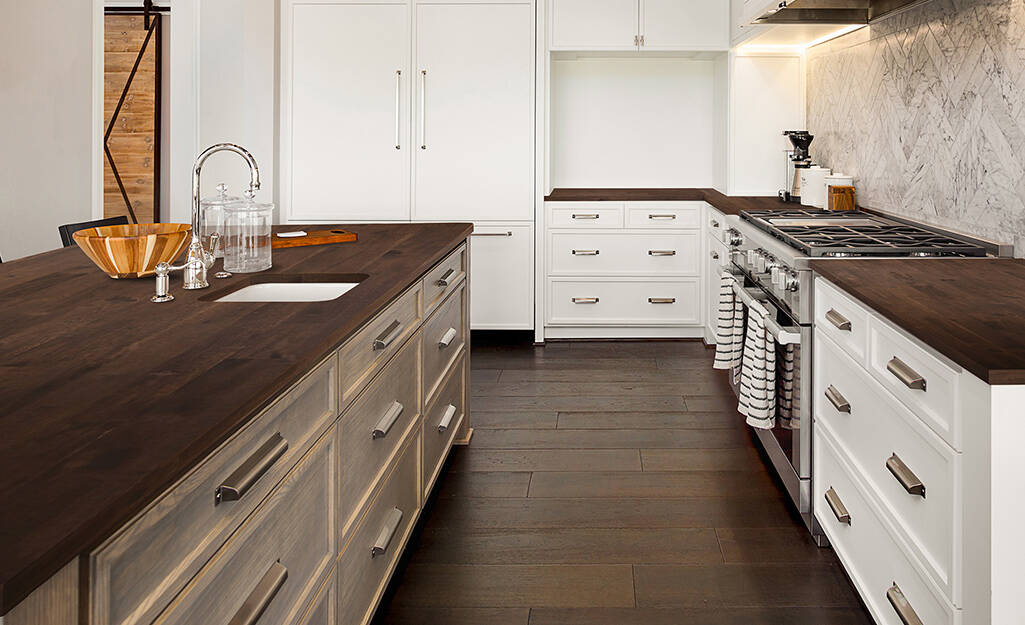
Image Source: homedepot.com
It will not be difficult at all to sand the butcher block material whenever you want it stained. Besides, it is useful to protect the wood from wearing out through sealing it, using hot pads and cleaning the spilled food as soon as possible. Butcher block, on the other hand, is perfect for DIY lovers since you can buy them at large home improvement centers as ready-made butcher block countertops.
Pros:
Cons:
8. Concrete Countertop
If your kitchen countertops are in an unusual shape, you can count on the concrete type. These are often cast directly in your kitchen because of their heavy weight. Besides, remember that these materials are not the same as pavement concrete slabs but rather highly polished concrete slabs that may be textured or acid-stained to generate colors.
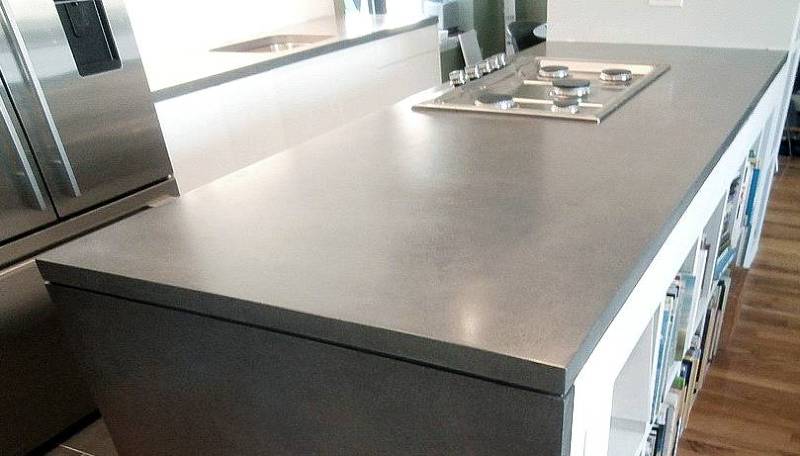
Image Source: countertopspecialty.com
Even though concrete can crack, modern treatments can help minimize the possibility. For example, you can use additives to reduce the concrete's porosity. On the other hand, concrete countertops may not be as cheap or as long-lasting as you may expect. And though DIY is possible, it is safe to hire a professional to ensure it's properly installed.
Pros:
Cons:
9. Ceramic Tile Countertop
If you are wondering what the best type of kitchen countertop with unique color and design is, try ceramic tile countertops. You can choose from mass-produced porcelain tiles to intricate hand-painted tiles. Ceramic tile countertops are durable and easy to maintain, and they're far less expensive than some natural stones such as Quartz or solid-surface counters.
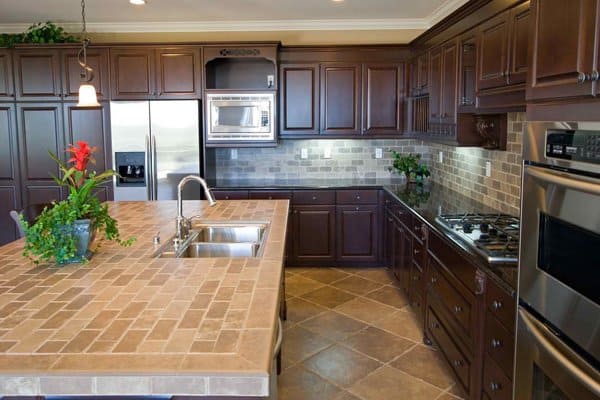
Image Source: homedesignlover.com
Furthermore, recent advancements in ceramic tile design provide more design options, including tiles resembling wood, marble, or even leather. This makes ceramic tiles among the best countertop materials that provide more design options.
However, ceramic tiles tend to crack, so avoid slamming large pots or pans. Also, cleaning the grout lines can sometimes be a bother, but choosing a deeper grout color might help.
Pros:
Cons:
10. Porcelain Countertop
Porcelain is made of ceramic clay, including minerals such as kaolinite and silica. Besides, the porcelain surfaces are heat, scratch, and stain resistant, as well as UV resistant. So you can have them in an open kitchen with direct sunlight without fading or sun damage.
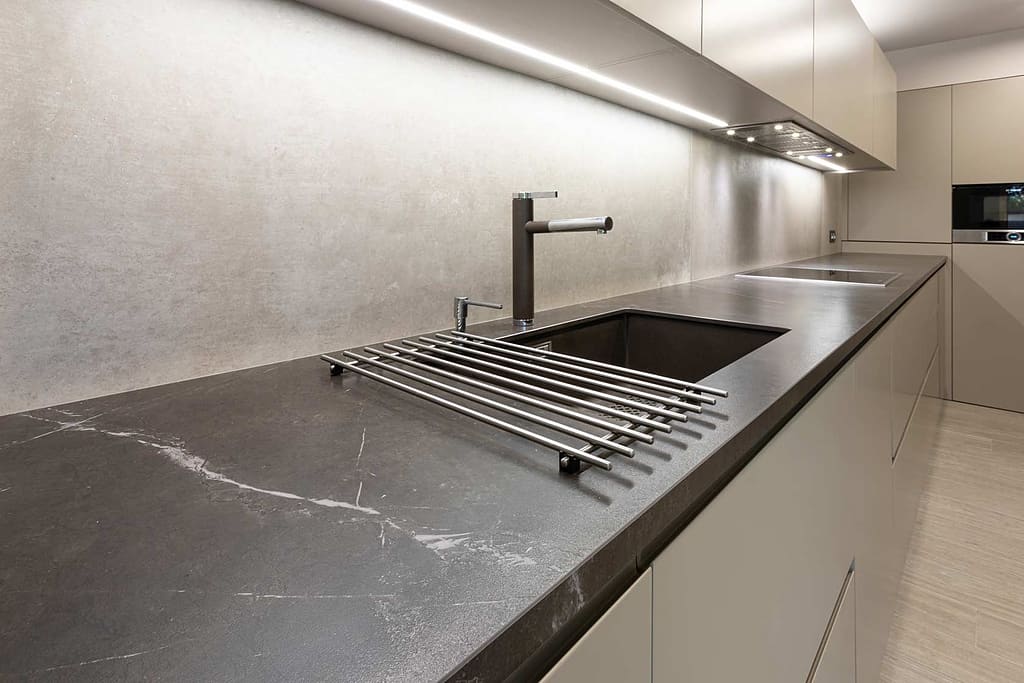
Image Source: archdaily.com
Yet another factor that makes most homeowners choose porcelain countertops is that the material is nonporous hence bacteria resistant. Besides, being a non-porous material porcelain does not retain any of the residual foods and liquids that may be remaining on the counter tops making it very hygienically suitable for kitchens.
This material allows using porcelain both in the indoor and outdoor kitchens so that the overall design of the house area would remain the same. This material is available in many kinds of colors and patterns and can emulate textures common on other countertop materials like concrete, custom tiles, marble, or wood.
Pros:
Cons:
Factors to Consider When Buying the Best Type of Kitchen Countertop
1. The material
When choosing the material for your kitchen countertops, you have several options, including granite, marble, laminate, Quartz, butcher block, ceramic tiles, concrete, porcelain, solid surface, and soapstone. Besides, depending on the design you want to achieve, you can mix and match some of these materials in large kitchen setups.
2. The Aesthetics
When figuring out the best type of kitchen countertop, remember to consider the aesthetics you want to achieve since each material is unique. Also, each material has a different texture which is also a crucial consideration.
3. Thickness
Before designing your kitchen countertops, consider the thickness of the material. In the United States, the standard countertop thickness is 1 ¼ inch (3 cm). This can, however, change depending on the design. For instance, porcelain is around ¼ inches thick, but waterfall edge countertops require a thickness of 2 to 2.5 inches.
The reason for considering the thickness of the countertops is to ensure they can sustain themselves. So choose a countertop that's sturdy and reliable.
4. Function
When determining the best kitchen countertop type, it's important to consider how you intend to use your kitchen. For example, do you prefer using your kitchen as a gathering area when you host? Or are you an enthusiastic home chef who enjoys spending time experimenting in search of your next favorite dish?
5. Seams and Seamless Appearance
When upgrading your kitchen, you want the countertop to be smooth and seamless. Besides, each material used in your countertop should be as large as possible to avoid seams and help cover any seams.
Conversely, if you want a professional to help with your countertops, look at how they handle seams, and you will know which one is right for you. Again, it's crucial to look for a professional who knows the value of seamless, smooth countertops and can work to help you achieve this.
6. Maintenance
Your kitchen countertops are not exceptional when it comes to wear and tear. Consequently, you will need to take the necessary steps to maintain them at some point. However, the frequency with which maintenance should happen depends on the material used on your kitchen countertops.
Though all kitchen countertops require frequent cleaning, porous materials such as granite countertops require more. Besides, it would be best if you acted quickly to remove stains and scratches from your countertops before they become permanent.
Featured Image Source: designerappliances.com





